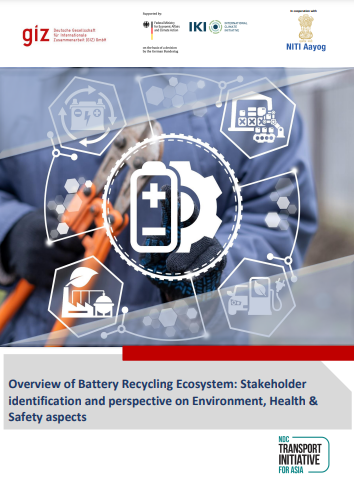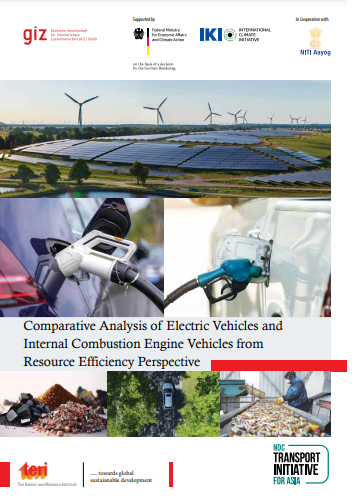Reports
The inaugural edition of the Critical Minerals Market Review provides a major update on the investment, market, technology and policy trends of the critical minerals sector in 2022 and an an initial reading of the emerging picture for 2023.
Freight Greenhouse Gas Calculator
2022
Author(s): Baindur D(GIZ India), Telling G (GIZ India), Rao IV(TERI), Rajendran P (GIZ India), Kumar PS(TERI), Prakash S(TERI), Mittal T(GIZ India)
The web-based user-friendly Freight GHG Calculator enables users to make an informed and sustainable modal choice decision. The calculator helps users in estimating the emissions and costs on account of the movement of freight through different transport modes.
Accelerating New Energy Vehicle Uptake in Chinese Cities: Assessment of New Energy Commercial Vehicle Policies
2023
Author(s): Jin L, Chu Y
Reviews major policies aimed at increasing the use of new energy commercial vehicles in 10 cities in 2020 and compares the initiatives with market performance.
Leveraging Carbon Markets for Cost-Efficient Emissions Reductions in India: Practical Recommendations for the Design and Implementation of an Effective Carbon Market
2023
Author(s): Hingne A, Agarwal V, Gupta S, Nath M, Kulkarni T
This report provides practical design and implementation recommendations for an effective carbon market in India, bringing together learnings from international carbon markets, India’s experience with market-based mechanisms over the two decades, and insights and industry feedback from a carbon market simulation.
R&D Roadmap for Green Hydrogen Ecosystem in India (Draft)
2023
Author(s): Government of India, Ministry of New and Renewable Energy (MNRE)
The draft roadmap emphasizes combination of hydrogen fuel cells, advanced batteries, and supercapacitors that will be key technologies in the automobile sector in the coming years.
World Investment Report 2023: Investing in Sustainable Energy for All
2023
Author(s): United Nations Conference on Trade and Development
The report shows that global foreign direct investment (FDI) fell 12% in 2022 and analyses how investment policy and capital market trends impact investment in the SDGs, particularly in clean energy. It highlights that developing countries need renewable energy investments of about $1.7 trillion each year but attracted only $544 billion in clean energy FDI in 2022.

Overview of Battery Recycling Ecosystem: Stakeholder identification and perspective on Environment, Health & Safety aspects
2023
Author(s): Sinha S J (NITI Aayog), Teja T (NITI Aayog), Sharma G (NITI Aayog), Mandal A (Deloitte India), Dikshit C (Deloitte India), Singha H (Deloitte India), Parihar A (Deloitte India), Tripathy A (Deloitte India), Mohapatra P (Deloitte India), Jain P (Deloitte India), Mishra S (Deloitte India), Bhagyasree (GIZ), Zhimomi T (GIZ)
The report focuses on providing an overview of battery recycling ecosystem from the perspective of stakeholder identification, risk identification, and its mitigation measures.

Comparative Analysis of Electric Vehicles and Internal Combustion Engine Vehicles from Resource Efficiency Perspective
2023
Author(s): Sinha S J (NITI Aayog), Teja J (NITI Aayog), Sharma G (NITI Aayog), Bhattacharjya S (TERI), Kaushik T (TERI), Pandey A (TERI), Singh M (TERI), Zhimomi T (GIZ)
This study assesses the various environmental performance of EV’s and ICEV’s (petrol, diesel and CNG) across 18 mid-point impacts and 3 end-point impacts.
Electric Vehicle Charging Infrastructure Siting Study to Support Freight Electrification
2022
Author(s): MP Ensystems
The study recommends that systematic study and support in the creation of EV charging Infrastructure (EVCI) would benefit the commodity haulage services while optimizing electricity grid impact and revenue maximization.
Towards Decarbonising Transport 2023: A Stocktake on Sectoral Ambition in the G20
2023
Author(s): Riehle E, Claire EL, Rublack E, Schmidt T, Sinha SJ, Teja J, Sharma G
This publication analyses the current state of decarbonisation and climate ambition in the transport sectors of G20 countries. G20 countries are responsible for the lion’s share of global transport emissions.



